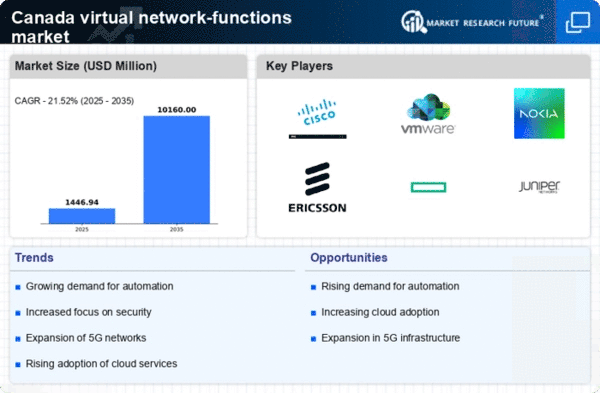Enhanced Network Security Posture
The virtual network-functions market in Canada is increasingly driven by the need for enhanced network security. As cyber threats become more sophisticated, organizations are prioritizing the implementation of robust security measures within their network infrastructure. Virtual network functions provide advanced security capabilities, such as intrusion detection and prevention systems, which are essential for safeguarding sensitive data. Recent studies suggest that companies investing in virtualized security solutions can reduce the risk of breaches by up to 40%. Consequently, the virtual network-functions market industry is likely to see continued growth as businesses seek to fortify their security posture against evolving threats.
Support for 5G Network Deployment
The rollout of 5G technology is a significant catalyst for the virtual network-functions market in Canada. As telecommunications providers expand their 5G networks, there is a growing need for virtualized solutions that can efficiently manage the increased data traffic and connectivity demands. The virtual network-functions market industry is poised to benefit from this trend, as virtualized network functions enable operators to deploy and manage 5G services more effectively. Analysts predict that the integration of virtual network functions with 5G infrastructure could enhance service delivery and customer experience, further driving market growth in the coming years.
Growing Demand for Network Flexibility
The virtual network-functions market in Canada is experiencing a surge in demand for network flexibility. Organizations are increasingly seeking solutions that allow them to adapt their network infrastructure to changing business needs. This flexibility is crucial for supporting remote work and dynamic workloads. According to recent data, the market is projected to grow at a CAGR of 15% over the next five years. This growth is driven by the need for scalable solutions that can efficiently manage network resources. As businesses continue to embrace digital transformation, the virtual network-functions market industry is likely to play a pivotal role in enabling agile network architectures that can respond to evolving demands.
Cost Efficiency and Resource Optimization
Cost efficiency remains a primary driver for the virtual network-functions market in Canada. Organizations are increasingly recognizing the financial benefits of adopting virtualized network solutions. By reducing reliance on physical hardware, companies can lower operational costs and optimize resource allocation. Reports indicate that businesses can achieve savings of up to 30% by transitioning to virtual network functions. This shift not only enhances cost-effectiveness but also allows for better utilization of existing infrastructure. As a result, the virtual network-functions market industry is positioned to thrive as organizations seek to maximize their return on investment while maintaining high-performance standards.
Regulatory Compliance and Data Sovereignty
In Canada, regulatory compliance and data sovereignty are critical factors influencing the virtual network-functions market. Organizations must adhere to stringent data protection regulations, which necessitate the implementation of secure and compliant network solutions. The virtual network-functions market industry is responding to this need by offering solutions that ensure data remains within Canadian borders, thereby addressing concerns related to data privacy. As businesses navigate the complexities of compliance, the demand for virtual network functions that facilitate adherence to regulations is expected to rise. This trend underscores the importance of integrating compliance features into network solutions.
















